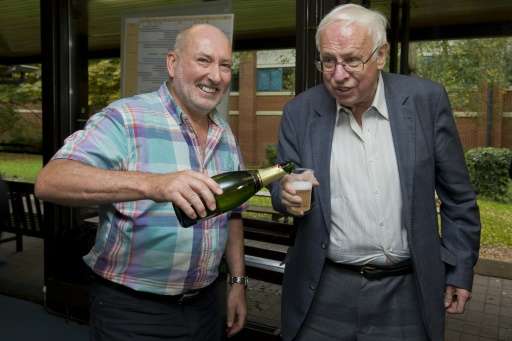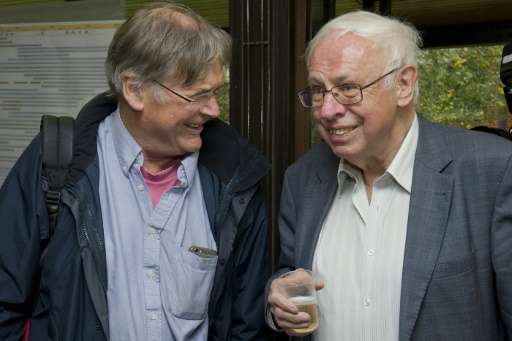Lindahl celebrates Nobel with plastic cup of champagne

Tomas Lindahl was toasted by colleagues with plastic cups of champagne and hastily-arranged party snacks after winning the Nobel Chemistry Prize on Wednesday.
Among the throng gathered at the Francis Crick Institute biomedical research centre was Britain's 2001 Nobel winner Tim Hunt who led the tributes to his old boss, saying he "richly deserved" the prestigious award.
In a crammed room at the institute in South Mimms, a village on London's M25 orbital motorway, researchers celebrated with the 77-year-old Swede, who was the centre's director from 1985 to 2006.
Lindahl said the news he received earlier was still sinking in.
"I was having breakfast. I planned to stay at home today and do some writing but I didn't get much done," he told AFP.
At a press conference, he said: "I had a phone call from a nice lady at the Swedish academy. We could switch over to Swedish which convinced me it wasn't some kind of hoax.
"It is very gratifying. We are doing basic research. We are not in it just to follow the stock market and make money. We do something constructive that we hope will really help mankind.
"We won't really be able to provide really effective cures for cancer until we understand how cells respond to DNA damage."

Lindahl, Paul Modrich of the United States and Aziz Sancar, a Turkish-American, won the prize for their work on how cells repair damaged DNA.
Their research is important in understanding cancer and finding effective cures.
'An absolute giant'
They share the prize sum of eight million Swedish kronor ($950,000, 855,000 euros), but Lindahl has no extravagant plans for his winnings, save a trip to Italy.
"I'm not going to do anything absolutely spectacular," he said.
"I've never been to Siena. It's like an outdoor museum and I would really like to see that."
As colleagues partied with mini chocolate logs, crisps and chocolate cornflake cakes—hallmarks of a swiftly-organised British office party—Hunt said Lindahl was "just the best boss".
"In the entire time he was the boss here, I can only remember one meeting. If he wanted to talk to you, he just wandered up and chatted," the 72-year-old told AFP.
"He's an absolute giant in the field, a great pioneer. He was one of the first people to very accurately measure how DNA decayed naturally."
Hunt, who won the 2001 Nobel Prize in Physiology or Medicine for his work on cell duplication, was caught up in a scandal in June over controversial remarks about female scientists.
The biochemist said Lindahl would find winning a Nobel came with side effects.
"You get to travel in the front of the plane more often and stay in better hotels," he remarked.
"And people take you terribly seriously—which can be both good and bad."
© 2015 AFP




















